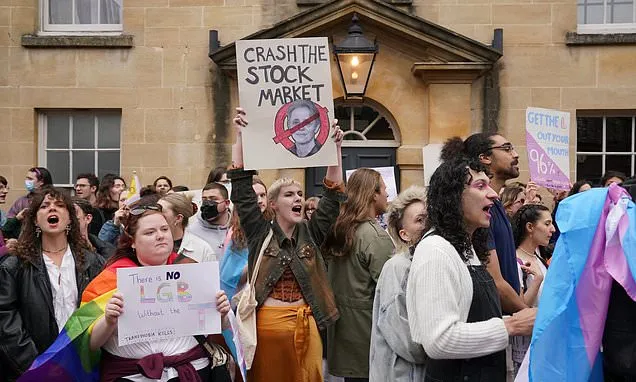Universities have failed to protect academics who hold gender-critical views from harassment, a report has found.
A review led by Alice Sullivan, a professor of sociology at University College London (UCL), said free speech and academic freedom have come "under attack" at UK universities by those who believe "treating sex as an important category 'denies the existence' of trans people'".
The report - on barriers to research on sex and gender identity - has called for staff and students who take part in freedom-restricting harassment to face "consequences commensurate with the seriousness of the offence".
Universities should critically review their policies and practices to remove "partisan policies and messaging on questions of sex and gender", it added.
The report follows a review of data, statistics and research on sex and gender, which was commissioned by the Department for Science, Innovation and Technology under the former Conservative government in February 2024.
Researchers investigating vital issues have been subjected to sustained campaigns of intimidation simply for acknowledging the biological and social importance of sex.
It came after high-profile cases of academics who faced harassment relating to their gender-critical views garnered media attention in recent years.
In March, the Office for Students (OfS) issued a fine of £585,000 to the University of Sussex for failing to uphold freedom of speech.
The watchdog's investigation into the university was launched after protests called for the dismissal of academic Professor Kathleen Stock in 2021 over her views on gender identity.
The OfS concluded the university's trans and non-binary equality policy statement had "a chilling effect" of possible self-censorship of students and staff on campus.
In January last year, an academic won an unfair dismissal claim against the Open University (OU) after she was discriminated against and harassed because of her gender-critical beliefs.
An employment tribunal found Professor Jo Phoenix - who was compared with "a racist uncle at the Christmas table" - was forced to quit her job because of a "hostile environment" created by colleagues and "insufficient protection" from the university.
Prof Sullivan's latest report cites evidence from a number of academics - including Prof Stock and Prof Phoenix - who have challenged the theory that sex is always less important than gender identity.
The report stated: "Several respondents to this review have suffered extreme personal consequences, both to their careers and to their physical and mental health, including post-traumatic stress disorder (PTSD) and extensive sick leave as a result of bullying, harassment and discrimination.
"The failure to adequately support and defend these individuals is a stain on the higher education sector."
The review concluded: "Campaigns of harassment have had devastating consequences for individuals and created a wider chilling effect for academia and the research community.
"University policies have often adhered to the tenets of gender-identity theory thus embedding discriminatory practices.
"In cases where individual academics or students have tried to resolve issues using internal mechanisms, these processes have often proven inadequate.
"Going to an employment tribunal is an exceptionally onerous and potentially career-ending step.
"Statements from higher education management representatives and bodies have typically downplayed and denied problems with academic freedom, dismissing or minimising concerns as 'media noise' or 'culture wars'."
Report author Prof Sullivan, from the UCL Social Research Institute, said: "The evidence I have collected raises stark concerns about barriers to academic freedom in UK universities.
"Researchers investigating vital issues have been subjected to sustained campaigns of intimidation simply for acknowledging the biological and social importance of sex.
"Excessive and cumbersome bureaucratic processes have exacerbated the problem by providing levers for activists to exert influence.
"Academic institutions need to examine their policies and processes carefully to avoid these unintended outcomes."
Among a series of recommendations, the report said senior leaders in higher education should acknowledge the reality of bullying and harassment by internal activists and "take on board the lessons of the Phoenix judgment".
Prof Phoenix, who resigned from the OU in December 2021 after she was harassed for her gender-critical views, said: "I just suggested that there was a different evidence base from which we could make assessments about the potential harms of placing males who identify as trans in female prisons and I set up a research network. That was all I ever did.
"But it was enough for the activist academics to stop my criminological research career in its track and to do so permanently."
A Government spokeswoman said: "We are taking strong action to protect academic freedom and free speech, which are fundamental to our world-leading universities.
"This includes introducing new duties on universities to ensure they are robust in promoting and protecting free speech on campus.
"It also comes alongside the firm steps the Office for Students is already taking, through fines and new guidance, to ensure universities remain beacons of academic freedom."
A Universities UK (UUK) spokeswoman said: "We agree that universities must protect and defend academic freedom and freedom of speech.
"They are bound to do so by law and, in England, there is a new regulatory approach under the Freedom of Speech Act which is about to come into force.
"These are complex issues. In practice universities are bound by law to protect the free speech of individuals who have very different views on contentious topics.
"They are required both to allow and facilitate protest, and to prevent that protest creating an intimidatory or chilling environment on campus or from preventing staff and students from pursuing their work and studies.
"We will carefully consider this report as part of our work in supporting universities as they navigate these difficult issues."
